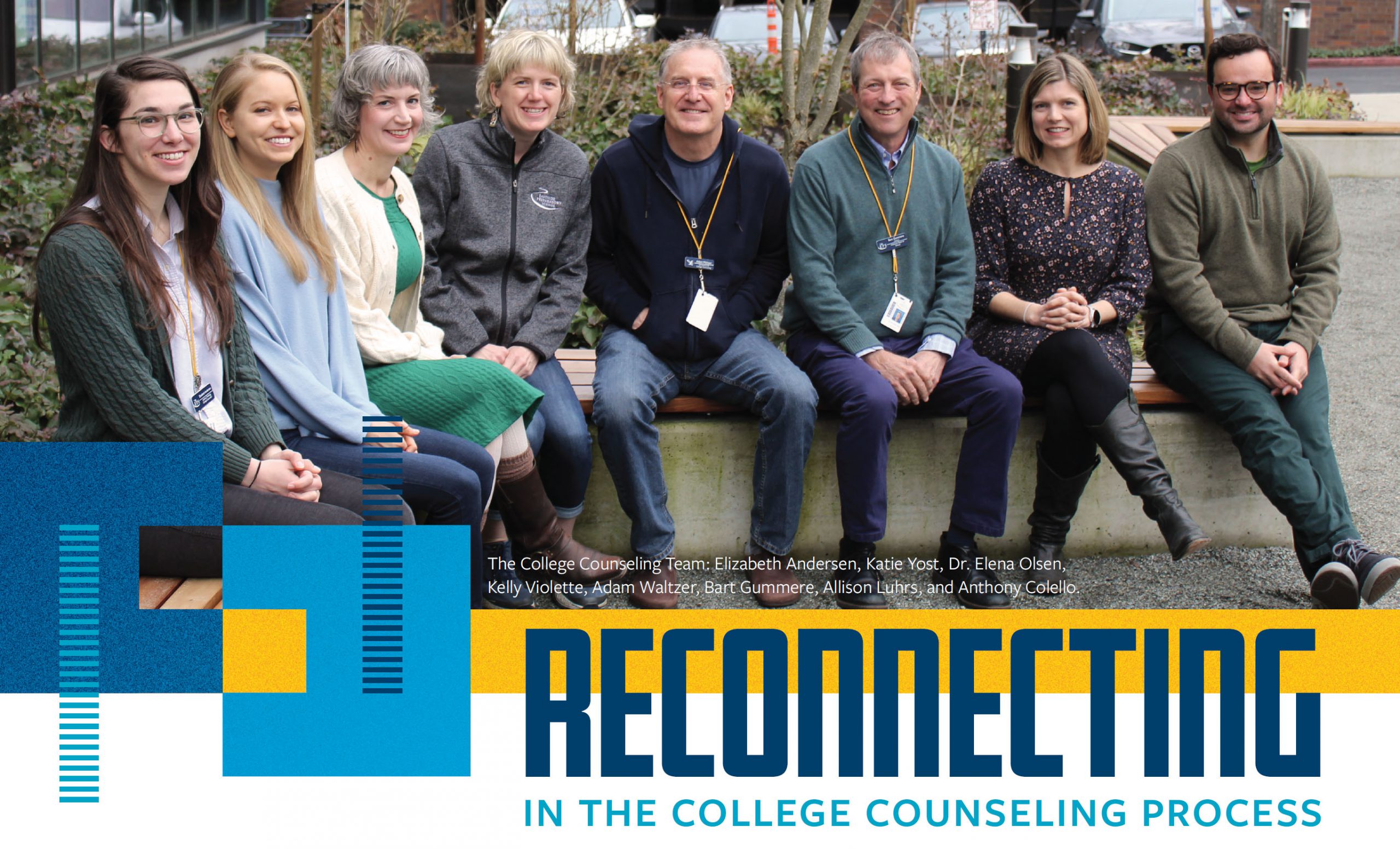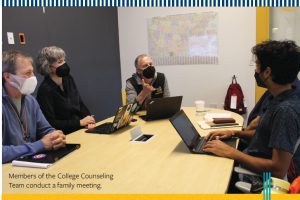
By Bart Gummere, Associate Head of School for College Counseling and Alumni Relations
As is chronicled through this issue, 2021-2022 has been a year of reconnecting. Our unique College Counseling program is designed around and strengthened by just such reconnection. With all our counselors teaching as a portion of their assignment, most students come into the process already knowing their Process Coach, Writing Coach, or both through previous work. This vastly improves the experience and connectedness for students and counselors alike.
As the class begin the college process in earnest during their junior year, there is a great deal of introspection and sharing required of each student. Speaking from prior experience, those initial meetings can be daunting for many students. It may be the first time they’ve ever spoken with their college counselor, and they are asked to share a lot about their lives, aspirations, hopes, and fears.
While no office can relieve all the vulnerability for students inherent in the process, EPS students are seldom facing this challenge with unfamiliar faces. Process Coach Adam Waltzer writes, “Eight members of this year’s varsity Ultimate team were also seniors who I worked with in college counseling. I’ve known many of these boys and families since Middle School. Having coached them as freshmen on the junior varsity team and then for two to three years on the varsity squad, working with them as they researched and applied to college felt like a natural extension of the relationships we’d built on the field.”
It isn’t just about making students comfortable initially. Kelly Violette reflects on her work as a Process Coach, “One of the most rewarding aspects of working at EPS is having the chance to develop relationships with students—and their families—that span several years. We have the opportunity to know a student when they are still a child, and then see them grow and change over these years of intense personal development. By the time we work with them in College Counseling, they are truly young adults. It is so fulfilling—and frequently inspiring—to hear a student take stock of who they are today, how they came to be that person, and what path they think is the best choice for them as they move into the next phase of their lives. When I’ve had the privilege of bearing witness to the same growth the student now reflects upon, it’s really a meaningful experience for us both.”
That familiarity also strengthens the quality of work students do in the application process. Dr. Elena Olsen, in her work as a Writing Coach, shares this important observation. “There is a lot of careful and subtle work we do in gaining students’ trust. Every year I have many moments of feeling profound admiration and gratitude for the vulnerability students bring to their work with me. That’s also not all because of our efforts—we benefit from students having learned that all of the adults in our community work hard to build connections with them, and by the time they’re working with us, they implicitly trust us and the culture of relationship-building.”
 Allison Luhrs, also a Writing Coach, agrees and adds, “Part of the Writing Coach job is helping students feel comfortable enough to share their true, unique selves in their personal statements. Thanks to years of advising seventh and eighth graders, every couple years I get a cohort of college counselees who I know especially well, and in our writing meetings I’m able to say things like, ‘Remember when you were dealing with X as a seventh grader?’ or, ‘You didn’t used to be so excited about biology. Tell me how this love developed.’ Students see themselves every day; having someone able to look back at their old selves and help them recognize their growth gives them a head start in understanding the kinds of stories they have to tell. I also think it enables them to get vulnerable more quickly, knowing they have an advocate in their Writing Coach.”
Allison Luhrs, also a Writing Coach, agrees and adds, “Part of the Writing Coach job is helping students feel comfortable enough to share their true, unique selves in their personal statements. Thanks to years of advising seventh and eighth graders, every couple years I get a cohort of college counselees who I know especially well, and in our writing meetings I’m able to say things like, ‘Remember when you were dealing with X as a seventh grader?’ or, ‘You didn’t used to be so excited about biology. Tell me how this love developed.’ Students see themselves every day; having someone able to look back at their old selves and help them recognize their growth gives them a head start in understanding the kinds of stories they have to tell. I also think it enables them to get vulnerable more quickly, knowing they have an advocate in their Writing Coach.”
It is our strong belief this system works best for the students, and it also may be that much more rewarding for us adults, too. Anthony Colello reflects, “Last winter, I had my first meeting with my junior cohort to review college research strategies. Many of those students were members of my first fifth grade class here at EPS. As we were sharing what we learned, and I was calling the names that I learned on my first day ever as a teacher, I was filled with an overwhelming feeling of pride. Seven years later, here they were sharing so thoughtfully about what they wanted from their next steps in life. It struck me how far they’d come and what a pleasure it has been to be able to watch them grow into the amazing people they are today.”
Elizabeth Andersen adds more of the same sentiment, “Having worked in the Middle School, coaching sports and facilitating clubs, it’s incredibly rewarding to reconnect with students through the college counseling process. To go from debating picks and trades in the Fantasy Football Club to discussing the merits of various colleges; from cheering runners across the finish line to encouraging them through the application process. To see how they have grown from fifth and sixth grade to these remarkable young people ready to take their next steps. It’s a fulfilling journey in and of itself but made even more so by the fact that I’ve known many of these students since they were middle school students.”
The first class of high school students I worked with as a college counselor graduated in 1987. Thirty-five years later the process remains interesting and fulfilling. We’re always pleased when students and families express happiness with the process. I’m even more pleased when I hear that appreciation from our graduates during and after their college career. We might refer to it as reconnecting with students during our college counseling process. Ultimately, I think of it as maintaining connection. A connection I hope continues between student and institution in perpetuity.

